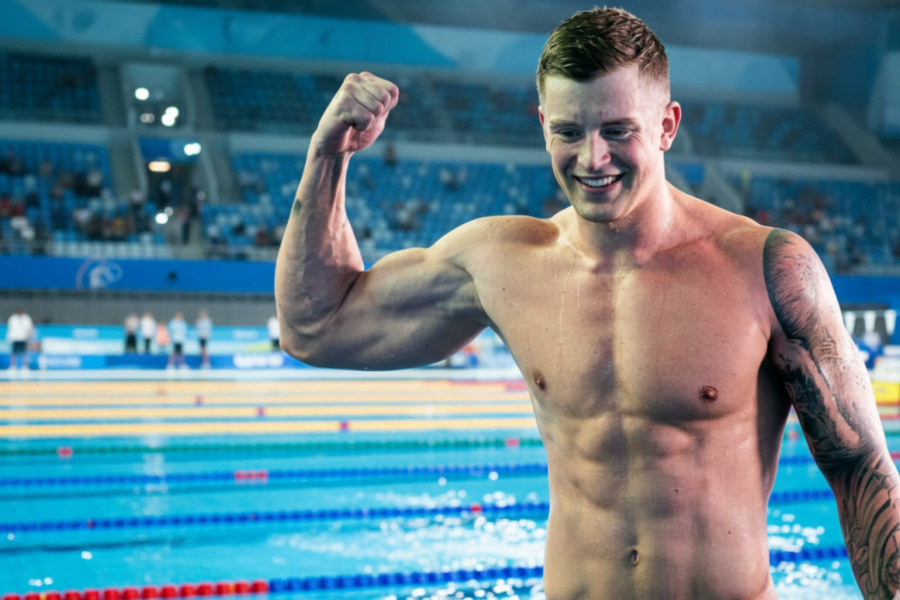British swimming sensation Adam Peaty has made headlines once again—not just for his performance at the Paris 2024 Olympics, where he claimed a silver medal, but for the powerful journey behind it. After stepping away from competitive swimming in 2023 to address his mental health, Peaty’s return to the Olympic stage represents something far greater than a podium finish. It’s a story of inner strength, vulnerability, and resilience.
Beyond the Pool: A Champion Faces His Struggles
Adam Peaty’s reputation in the world of swimming is legendary. The breaststroke powerhouse is an eight-time World Champion, sixteen-time European Champion, and four-time Commonwealth Champion. But even for someone who’s broken records and made Olympic history, life outside the pool hasn’t always been smooth.
In April 2023, Peaty made headlines not for a win, but for withdrawing from the British Swimming Championships. He later revealed that he was struggling with depression and alcohol abuse, and had been diagnosed with Attention Deficit Hyperactivity Disorder (ADHD).
“This Is Like Seeing My Therapist…”
In a revealing interview with The Telegraph, Peaty reflected deeply on his mental health challenges and his belief that ADHD has shaped both the highs and lows of his career. Though he hasn’t had a formal diagnosis, he strongly identifies with the traits and has felt its impact throughout his life.
“People with ADHD have a drive – I can’t sit still, I like being the best.”
Midway through the interview, Peaty paused and said to the journalist:
“This is like seeing my therapist…”
The statement underscored the weight of what he’s carried and how much these moments of reflection mean for someone who has spent years fighting invisible battles behind the scenes.
The Road to Recovery and Olympic Return

Following his break from the sport, Peaty returned to training with a renewed mindset and a healthier perspective on performance. As he prepared for the Paris 2024 Olympics, he focused on not just physical strength, but emotional readiness too.
“The physical preparation goes on so my body will be ready to fight again when my heart and mind have caught up. I’ll be ready when I need to be ready.”
And ready he was.
At the Paris Olympics, Peaty secured a silver medal, proving that success isn’t only about standing at the top of the podium—it’s also about getting back up after you’ve fallen. As he stood on the stage, emotion took over.
“It doesn’t matter what the time says on the board, I know that in my heart I’ve already won.”
“I’m not crying because I’ve come second, I’m crying because it took so much to get here.”
A Father's Drive and Motivation
Outside of swimming, Peaty’s personal life has seen big changes. In April 2020, he became a father. But two years later, he announced his separation from his partner. Now in a relationship with Holly Ramsay, daughter of celebrity chef Gordon Ramsay, Peaty says fatherhood remains one of his biggest motivators.
His son was there in Paris to watch him compete—and cheer him on.
“He normally goes ‘Daddy, are you the fastest boy?’ And I would have said: ‘Not today’. But he just says: ‘I love you, Daddy.’ That’s what I care about.”
Let’s Talk About Mental Health in Sport
Peaty’s openness has helped spark important conversations around mental health in elite sports. Athletes often carry enormous pressure—both from the public and themselves—to perform at the highest level. Yet behind the medals and achievements, many are struggling.
By speaking out about his own journey, Peaty is helping to break the stigma. He’s shown that asking for help doesn’t make you weak—it makes you human.
His story offers hope to other athletes and fans alike, encouraging them to seek support rather than suffer in silence.
What is ADHD?

Attention Deficit Hyperactivity Disorder (ADHD) is a condition that affects focus, behaviour, and self-regulation. It often involves symptoms of:
- Inattention – Difficulty concentrating or staying on task
- Hyperactivity – Constant movement or talking
- Impulsivity – Acting without thinking or poor self-control
ADHD is more commonly diagnosed in boys than girls, as boys tend to show more overt signs of hyperactivity. Girls may present with quieter symptoms, such as daydreaming or inattentiveness, which can lead to underdiagnosis.
What Causes ADHD?
While there’s no single known cause of ADHD, genetics play a major role. It often runs in families. People with a parent or sibling with ADHD are more likely to have it themselves. Environmental factors, brain structure, and neurochemical imbalances also contribute.
Final Thoughts
Adam Peaty’s story isn’t just about medals. It’s about honesty, perseverance, and the willingness to fight not just in the pool—but within himself. His journey through mental health struggles, ADHD, and personal hardship offers an empowering message:
You don’t have to be perfect to be powerful.
You don’t have to be first to be inspiring.
You just have to keep going.
And like Peaty, you may find that the greatest victory is simply showing up and giving your all.





.svg)

.svg)


